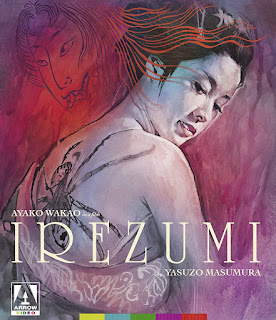Irezumi
Tattoos are still quite trendy; although expressing your style, taste or romantic devotion in permanent ink never seemed to be the wisest decision considering all three of those factors are likely to change…along with your saggy skin. But tattoos have a darker stigma as well, signifying ownership, property and dehumanization. In 1966’s Irezumi, directed by Yasuzo Masumura, the artwork forcibly inked on a geisha’s back takes on an almost supernatural quality, the darkness within awakening to match the evil without.
Anxious to elope with her lover, Otsuya is duped by a family friend who sells her into slavery as a high-end geisha. To ensure her fidelity, the new owner instructs a tattoo artist to create a distinctive spider design on her back. Meanwhile her lover, Shinsuke, murders in self-defense and becomes a lovelorn outlaw, still plotting how to win his fiancé back. But Otsuya excels in the art of “consuming” men, using her natural skills to exact revenge on those who ruined her life…but also ruining her own in the process.
Masumura, whose Giants and Toys and Black Test Car (also released by Arrow Films) were trend-setting examples of the Japanese salaryman genre, was never one to shy away from conflicted characters. And Otsuya, despite the circumstances, is never a victim. The film strongly suggests she was predisposed to a life of toying with men’s emotions; her imprisonment is merely a convenient excuse to do more of the same. Even Shinsuke, whose naïve loyalty and guilty conscience makes him the film’s most likely protagonist, is a character that engenders little sympathy.
Inspired by the macabre work of Edgar Allen Poe and shot in a studio-bound environment, Irezumi feels haunted despite a lack of genuine ghosts or spirits. There’s something unsettling in nearly every frame, a feeling that’s amplified by Kazuo Miyagawa’s cinematography, made up of deep shadows and foggy blues. It’s a beautifully disturbing film that, like most of Masumura’s work, has gone underappreciated for far too long.
Arrow Film’s Blu-ray is sumptuous to look at and includes an audio commentary, 10-minute introduction by Japanese cinema expert Tony Rayns, visual essay, trailer, image gallery and illustrated collector’s booklet.




Comments
Post a Comment